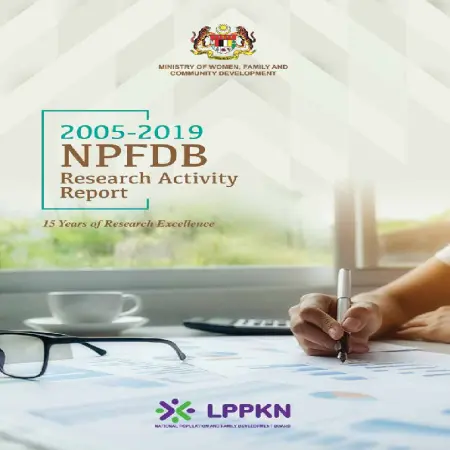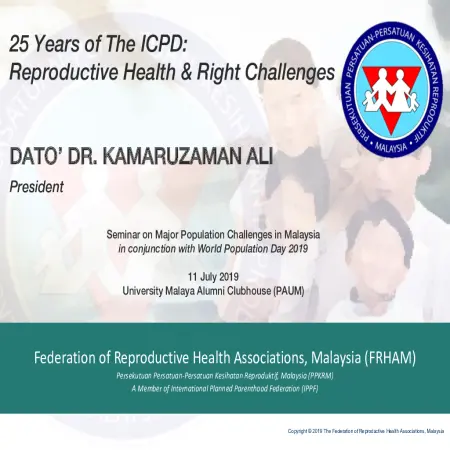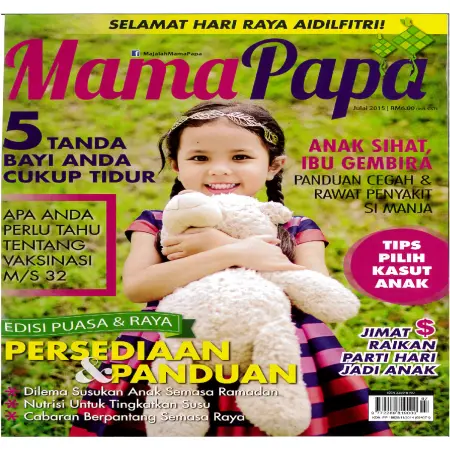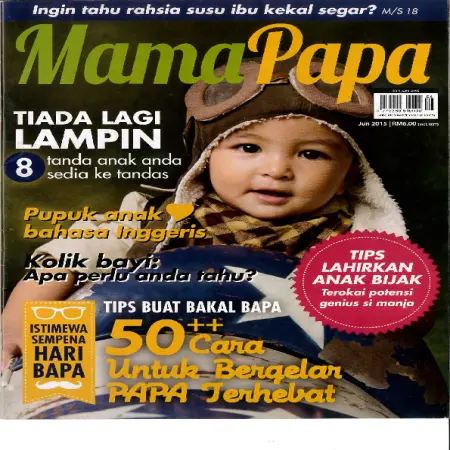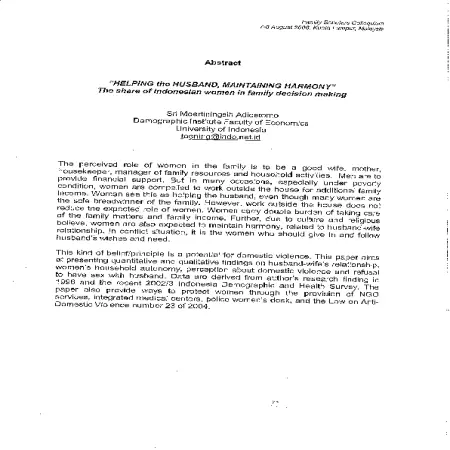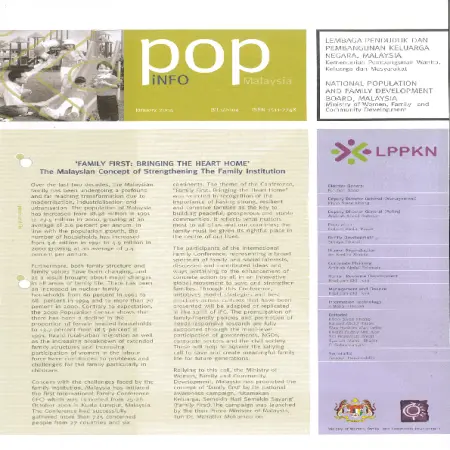Advanced Search
|
|
“The thirtieth anniversary of the International Conference on Population and Development Programme of Action (ICPD-Poa)”
Item Type: Newsletter
Editor:
Year: 00/07/2024
Abstract: Over the last thirty years, Malaysia has implemented many programs and intervention strategies to integrate population factors in socio-economic development planning to enhance the wellbeing of its citizens. The Government will continue to work towards creating policy prescriptions that are fair, equitable as well as inclusive, in commitment of leaving no one behind in efforts to remain a peaceful and prosperous nation.
|
|
|
|
|
|
2005-2019 NPFDB research activity report
Item Type: Book
Editor:
Year: 00/00/2019
Abstract: This report highlights the research programmes and activities conducted by NPFDB over the past 15 years. One of the primary functions of NPFDB is to identify, promote and conduct research and studies on population, family development and reproductive health. NPFDB is responsible to advise the government on matters relating to policies and programmes through the findings of research in these three thematic areas. The Board established the Research Committee in 2009 to identify priority research, provide guidance and monitor the research activities in NPFDB. The first Research Committee meeting was held on 13th January 2010 comprising of selected NPFDB Board Members including Associate Professor Tey Nai Peng as Chairman (University of Malaya), Associate Professor Normah Mohd Dali (MARA University of Technology), Datuk Dr. Zulkifli Haji Ismail (Selangor Medical Center), Associate Professor Siti Hawa Ali (University Science Malaysia), Dato’ Dr. Kamaruzaman Ali (FRHAM) and Mr. Lee Wee Min (Focus on the Family) and several division directors of NPFDB.
|
|
|
|
|
|
25 Years of the ICPD: reproductive health and rights challenges
Item Type: Conference or Workshop Item
Editor:
Year: 00/00/2019
Abstract: To increase contraceptive prevalence will require strengthening the information, education and skills development of health care providers, repositioning of family planning, more public awareness on benefits and side effects of modern contraceptives, keeping abreast with modern contraceptive technology including LARC, male/boy responsibility programs, better data collection and monitoring including from the young and unmarried, collaboration and coordination with all stakeholders and delivery of quality services to all without discrimination and stigmatization.
|
|
|
|
|
|
10 saat pelukan keluarga
Item Type: Article
Editor:
Year: 00/07/2016
Abstract: “10 saat pelukan keluarga” is the best gift a child can give to their parents. This gift is more meaningful than money and diamond gold. When a person does a hug, it will stimulate the skin cells that are detected through touch and caress that will be channeled through the nerves to the brain. Next, the brain will release three hormones that act as "natural transmitters" that cause us to feel happier and less stressed. The three hormones are serotonin, dopamine and oxytocin.
|
|
|
|
|
|
10 tips luangkan masa berkualiti bersama keluarga
Item Type: Article
Editor:
Year: 03/06/2015
Abstract: Quality time with family is when family members can spend time with mutual benefits. The time is filled with activities or interactions that can further strengthen the relationship between family members. This article shares about 10 tips to spend quality time with family such as, praying together, eating, tidying and cleaning the house together, studying children's lessons, shopping, doing leisure activities together, traveling, family reunions, doing hobbies together, and corner mini library.
|
|
|
|
|
|
"Helping the husband, maintaining harmony" : the share of Indonesian women in family decision making
Item Type: Conference or Workshop Item
Editor:
Year: 00/00/2006
Abstract: The perceived role of women in the family is to be a good wife, mother, housekeeper, manager of family resources and household activities. Men are to provide financial support. But in many occasions, especially under poverty condition, women are compelled to work outside the house for additional family income. Women see this as helping the husband, even though many women are the sole breadwinner of the family. However, work outside the house does not reduce the expected role of women. In the meantime, women carry double burden of taking care of the family matters and family income. Further, due to culture and religious believe, women are also expected to maintain harmony, related to husband-wife relationship. In conflict situation, it is the women who should give in and follow husband's wishes and need. This kind of belief/principle is a potential for domestic violence. This paper aims at presenting quantitative and qualitative findings on husband-wife's relationship, women's household autonomy, perception about domestic violence and refusal to have sex with husband. Data are derived from author's research finding in 1996 and the recent 2002/3 Indonesia Demographic and Health Survey. The paper also provide ways to protect women through the provision of NGO services, integrated medical centers, police women's desk, and the Law on Anti-Domestic Violence number 23 of 2004.
|
|
|
|
|
|
'Family first: bringing the heart home': the Malaysian concept of strengthening the family institution
Item Type: Newsletter
Editor:
Year: 00/01/2004
Abstract: "Family First: Bringing the Heart Home" was selected in recognition of the importance of having strong, resilient and cohesive families as the key to building peaceful, prosperous and stable communities. It reflects what matters most to all of us and our countries; the family place in centre of our lives.
|
|
|
|






